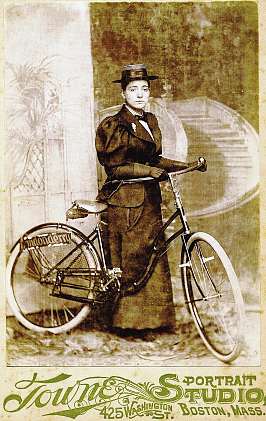
Annie Cohen Kopchovsky, also known as Annie Londonderry, became famous for her record-setting bike ride.
I thought a simple story time and craft event would be harmless.
I was wrong.
Celebrating Women’s History Month by reading a picture book about a woman’s bicycle journey turned out to be more controversial than I ever imagined.
My picture book, “Pedal Pusher,” tells the story of Annie Cohen Kopchovsky. In 1895, she became the first woman to bike around the world — a feat she undertook after two men bet no woman could possibly succeed. As Annie pedaled, she challenged stereotypes, expanded opportunities for women and showed that a bicycle could be a tool for freedom.
That’s the dangerous part, apparently.
The Tacoma Children’s Museum invited me to lead two story time events based on the book. The first, at the downtown Tacoma location, went off without a hitch.
The second, scheduled at the museum’s site on Joint Base Lewis-McChord— the largest Army-led base in the U.S. — was abruptly canceled.
Four days before the event, I was told it violated the administration’s executive order restricting so-called “radical” Diversity, Equity, and Inclusion programs across federal institutions. Someone complained when they saw my story time being promoted.
Museum higher-ups appealed to military attorneys, who ruled that the program about a pioneering cyclist was out of bounds.
Let that sink in: the Commander-in-Chief of the U.S. military had effectively declared a woman on a bike too threatening for children.
Since January, the Pentagon has erased nearly 100,000 images and posts, many honoring women and people of color, from the internet.
Now that purge extended to a story time featuring a 700-word picture book.
When museum staff later suggested the event might have gone forward if it hadn’t been advertised, I couldn’t help but think: If we can only celebrate women’s achievements in secret, is that really a celebration at all? At first, I considered staying quiet. There are six elementary schools on that base and many more across the country. I didn’t want to put their libraries at risk. But silence only enables censorship.
So, I reported the cancellation to my publisher and to literacy advocates. A contact at the American Library Association said that bans and blocked events tied to Black History Month had been widespread. This, he told me, was the first Women’s History Month program he’d seen canceled. His reaction? “It’s hard to keep up with the horror show.”
This is what reading and promoting banned books is all about: shining a light on the silencing of stories that don’t conform to someone else’s agenda. My story time wasn’t canceled because it was inappropriate for kids. It was canceled because it dared to center a woman who defied expectations.
Whether it’s in libraries, schools, or community spaces, I’ll continue to share stories that celebrate resilience, courage, and progress. I hope you will, too.
Because history isn’t radical — it’s reality. And every child deserves to know it.
Mary Boone lives in Tacoma. She has written 70-plus nonfiction books for young readers.
‘My take’
Got something to say about a topic in the news? We’re looking for personal essays with strong opinions. Send your submission of no more than 500 words to oped@seattletimes.com with the subject line “My Take.”